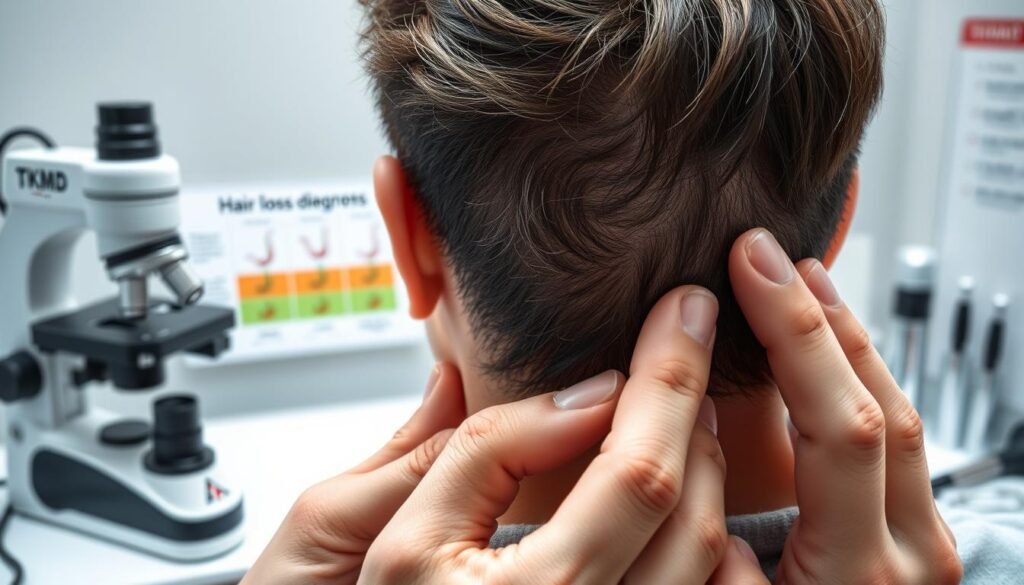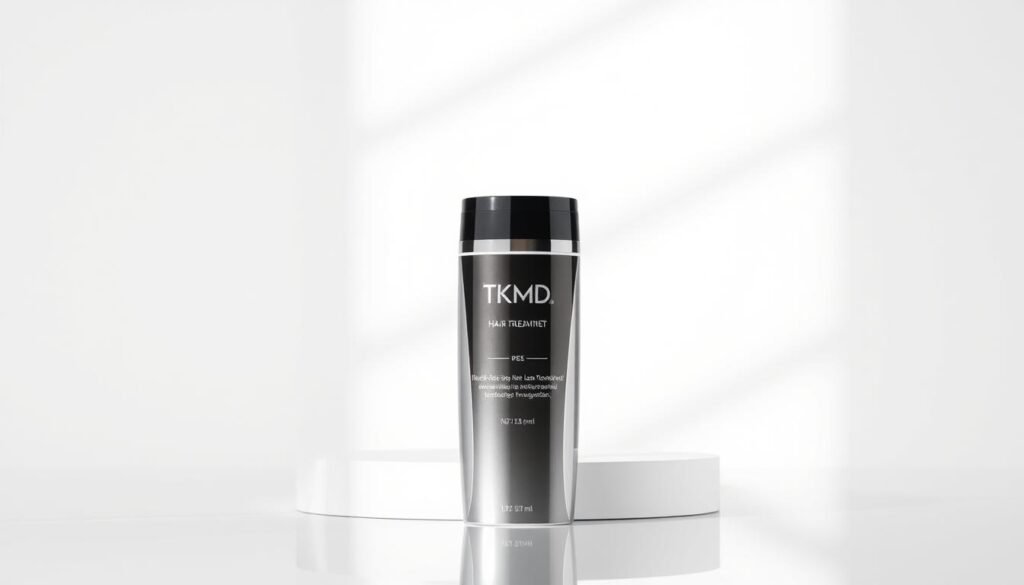Experiencing hair loss can be distressing, affecting not only your appearance but also your overall well-being. It’s a common condition that can lead to significant psychological distress if left unaddressed.
Seeking advice from a healthcare professional is crucial in addressing hair loss promptly. Different types of hair loss require different approaches to treatment, making it essential to consult the right specialist for proper diagnosis and effective treatment options.
Understanding the underlying condition causing your hair loss is vital for receiving the right treatment. This comprehensive guide will help you navigate the healthcare system to find the most appropriate specialist for your hair loss concerns.
Key Takeaways
- Understanding the cause of your hair loss is crucial for effective treatment.
- Different types of hair loss require different treatment approaches.
- Consulting the right specialist is essential for proper diagnosis.
- Early intervention can significantly improve treatment outcomes.
- Various medical professionals specialize in hair loss treatment.
Understanding Hair Loss: Types and Causes
Understanding the intricacies of hair loss is crucial for effective management and treatment. Hair loss, a condition affecting millions, can stem from a variety of factors, ranging from genetic predispositions to environmental influences.
Common Types of Hair Loss
Hair loss can be categorized into several types, including androgenetic alopecia, alopecia areata, and telogen effluvium. Androgenetic alopecia, the most common form, is characterized by a gradual thinning of hair due to hormonal influences and genetics.
- Androgenetic Alopecia: Influenced by genetics and hormones, leading to patterned hair loss.
- Alopecia Areata: An autoimmune condition causing patchy hair loss.
- Telogen Effluvium: A condition triggered by stress, leading to excessive hair shedding.
Underlying Causes of Hair Fall
The causes of hair loss are multifaceted, involving a complex interplay of genetic, hormonal, and environmental factors. Hormonal changes, particularly those related to thyroid disorders, pregnancy, and menopause, can significantly impact hair health.
| Cause | Description | Impact on Hair |
|---|---|---|
| Genetic Predisposition | Inherited traits influencing hair loss patterns. | Patterned hair thinning or loss. |
| Hormonal Imbalances | Changes in hormone levels, especially androgens and thyroid hormones. | Hair loss or excessive shedding. |
| Nutritional Deficiencies | Lack of essential nutrients like iron, zinc, and vitamins. | Compromised hair follicle health, leading to hair loss. |
Hair loss is often associated with the health of hair follicles, which are sensitive to changes in the body’s internal environment, including stress and scalp conditions. Understanding these factors is crucial for addressing hair loss effectively.
For Hair Fall Which Doctor to Consult: Specialists Overview
When dealing with hair fall, it’s crucial to consult the right specialist for effective treatment and guidance. Hair loss can be caused by various factors, including medical conditions, genetics, and lifestyle factors. Identifying the underlying cause is essential to determining the appropriate specialist to consult.
Dermatologists: Skin and Scalp Experts
Dermatologists are medical doctors who specialize in the diagnosis and treatment of skin, hair, and nail disorders. They are often the first point of contact for individuals experiencing hair loss, as they can diagnose and treat conditions such as alopecia areata, scalp infections, and other dermatological conditions that may be contributing to hair fall. For more information on dermatological conditions, you can visit this resource.
Trichologists: Hair and Scalp Specialists
Trichologists are specialists who focus on the health of hair and scalp. While not medical doctors, they have specialized training in the diagnosis and treatment of hair and scalp disorders. Trichologists can provide guidance on hair care, diagnose hair loss conditions, and recommend treatments.
Other Medical Specialists for Hair Loss
Depending on the underlying cause of hair loss, other specialists may be consulted. For instance, endocrinologists may be involved if hair loss is related to hormonal imbalances or thyroid disorders. Rheumatologists can help if hair loss is associated with autoimmune diseases like lupus. Additionally, nutritionists and dietitians can offer advice on dietary changes to address nutritional deficiencies that may be contributing to hair loss.

- Endocrinologists for hormonal imbalances and thyroid disorders
- Rheumatologists for autoimmune diseases
- Nutritionists and dietitians for nutritional deficiencies
- Gynecologists for female pattern hair loss related to hormonal changes
- Hematologists for blood disorders or iron deficiency anemia
- Mental health professionals for psychological aspects of hair loss
When to See a Dermatologist for Hair Loss
If you’re experiencing hair loss, knowing when to consult a dermatologist can make a significant difference. Hair loss can be caused by a variety of factors, including genetics, hormonal changes, and certain medical conditions.
Signs Your Hair Loss Needs Medical Attention
It’s essential to recognize the signs that indicate your hair loss requires professional care. These include sudden or excessive hair shedding, bald patches, or hair loss accompanied by other symptoms like itching or redness of the scalp.
What to Expect During Your First Dermatology Visit
During your initial consultation, the dermatologist will conduct a comprehensive review of your medical history, including any previous treatments or conditions that might be contributing to your hair loss. For more detailed information on what to expect, you can visit this resource.
- A thorough examination of your scalp will be performed, potentially using a dermatoscope to closely examine hair follicles and scalp condition.
- The dermatologist may perform a “pull test” to assess the severity of hair shedding.
- In some cases, additional diagnostic procedures like blood tests or a scalp biopsy might be recommended.
By the end of your first visit, the dermatologist should provide an initial assessment and outline potential diagnosis and treatment approaches tailored to your specific type of hair loss.

The Role of Trichologists in Hair Loss Treatment

Understanding the role of trichologists is essential for those seeking comprehensive hair loss treatment. Trichologists are specialists who focus on the health of hair and scalp, providing care for conditions such as alopecia and scalp psoriasis.
Trichologist Qualifications and Training
Trichologists undergo specialized training in the care and treatment of hair and scalp disorders. Although they are not medical doctors, they can offer expert advice on hair loss and scalp conditions.
Trichologist vs. Dermatologist: Key Differences
The primary difference between trichologists and dermatologists lies in their medical credentials and scope of practice. Key differences include:
- Dermatologists are licensed physicians who can prescribe medications and perform surgical procedures.
- Trichologists focus on non-prescription treatments and lifestyle recommendations for hair and scalp conditions.
Diagnostic Procedures for Hair Loss
To determine the underlying cause of hair loss, healthcare professionals employ a range of diagnostic procedures. These tests help identify the root cause of the condition, enabling effective treatment.
Physical Examination and Hair Analysis
A thorough physical examination of the scalp and hair is typically the first step in diagnosing loss. This may involve a visual inspection, trichoscopy, or other non-invasive techniques to assess hair density and scalp health.
Blood Tests and Advanced Diagnostics
Blood tests are frequently ordered to identify underlying medical conditions that may contribute to hair loss, including thyroid disorders, hormonal imbalances, and nutritional deficiencies. The following table summarizes common diagnostic tests:
| Diagnostic Test | Purpose |
|---|---|
| Complete Blood Count (CBC) | Detects anemia, infection, or blood disorders |
| Hormone Panels | Assesses levels of androgens, estrogen, progesterone, and thyroid hormones |
| Nutritional Assessments | Measures levels of iron, zinc, vitamin D, and other essential nutrients |
| Autoimmune Markers | Tests for conditions like alopecia areata or lupus |
For more information on diagnosing and treating hair loss, visit https://www.aad.org/public/diseases/hair-loss/treatment/diagnosis-treat. In some cases, blood tests may reveal underlying conditions such as hormonal changes in women and men that contribute to hair loss.

Treatment Options Recommended by Specialists

Effective hair loss treatment involves a multi-faceted approach, incorporating medical, surgical, and lifestyle interventions. Specialists consider various factors, including the underlying cause of hair loss, overall health, and individual preferences when recommending treatment options.
Medications for Hair Loss
Medications are a common treatment for hair loss, with options available to promote hair growth and slow down hair loss. These medications can be topical or oral and are often used in conjunction with other treatments.
Procedures and Surgeries
For more severe cases of hair loss, procedures and surgeries may be recommended. One such treatment is platelet-rich plasma (PRP) therapy, which involves injecting a concentration of platelets from your own body into the scalp to stimulate hair growth. PRP therapy is a natural, all-natural treatment that can help re-energize cells and promote hair regrowth.
Lifestyle and Nutritional Recommendations
Lifestyle and nutritional changes can also play a significant role in promoting hair health. This includes maintaining a balanced diet rich in proteins, essential fatty acids, and vitamins, as well as managing stress through techniques like meditation and regular exercise. Additionally, gentle hair care practices, scalp massage, and proper hydration can support overall body function and hair growth.
Conclusion: Taking Action Against Hair Loss
Addressing hair loss effectively requires a comprehensive approach that involves understanding the underlying causes and selecting the right specialist. Different types of hair loss treatment have varying side effects, and follow-up care needs will differ accordingly. Consulting a dermatologist or trichologist can help determine the best course of action. For instance, conditions affecting hair follicles may require medical attention from a dermatologist. Ongoing care and treatment adjustments are crucial for managing hair loss over time. For more information on related health topics, visit our guide on skin health. Effective management can lead to improved outcomes in regrowing hair.


